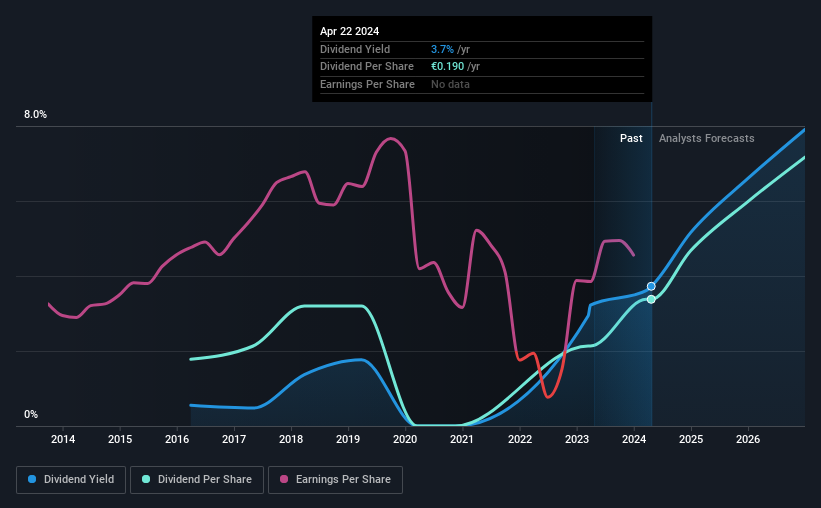Stock Analysis

Multitude SE (ETR:FRU) is about to trade ex-dividend in the next three days. The ex-dividend date is one business day before the record date, which is the cut-off date for shareholders to be present on the company's books to be eligible for a dividend payment. It is important to be aware of the ex-dividend date because any trade on the stock needs to have been settled on or before the record date. Thus, you can purchase Multitude's shares before the 26th of April in order to receive the dividend, which the company will pay on the 7th of May.
The company's next dividend payment will be €0.19 per share, on the back of last year when the company paid a total of €0.19 to shareholders. Last year's total dividend payments show that Multitude has a trailing yield of 3.7% on the current share price of €5.10. If you buy this business for its dividend, you should have an idea of whether Multitude's dividend is reliable and sustainable. So we need to check whether the dividend payments are covered, and if earnings are growing.
View our latest analysis for Multitude
If a company pays out more in dividends than it earned, then the dividend might become unsustainable - hardly an ideal situation. That's why it's good to see Multitude paying out a modest 37% of its earnings.
Companies that pay out less in dividends than they earn in profits generally have more sustainable dividends. The lower the payout ratio, the more wiggle room the business has before it could be forced to cut the dividend.
Click here to see the company's payout ratio, plus analyst estimates of its future dividends.

Have Earnings And Dividends Been Growing?
When earnings decline, dividend companies become much harder to analyse and own safely. Investors love dividends, so if earnings fall and the dividend is reduced, expect a stock to be sold off heavily at the same time. Readers will understand then, why we're concerned to see Multitude's earnings per share have dropped 11% a year over the past five years. Ultimately, when earnings per share decline, the size of the pie from which dividends can be paid, shrinks.
The main way most investors will assess a company's dividend prospects is by checking the historical rate of dividend growth. In the last eight years, Multitude has lifted its dividend by approximately 8.4% a year on average.
To Sum It Up
From a dividend perspective, should investors buy or avoid Multitude? Multitude's earnings per share are down over the past five years, although it has the cushion of a low payout ratio, which would suggest a cut to the dividend is relatively unlikely. We're unconvinced on the company's merits, and think there might be better opportunities out there.
If you're not too concerned about Multitude's ability to pay dividends, you should still be mindful of some of the other risks that this business faces. In terms of investment risks, we've identified 1 warning sign with Multitude and understanding them should be part of your investment process.
A common investing mistake is buying the first interesting stock you see. Here you can find a full list of high-yield dividend stocks.
Valuation is complex, but we're helping make it simple.
Find out whether Multitude is potentially over or undervalued by checking out our comprehensive analysis, which includes fair value estimates, risks and warnings, dividends, insider transactions and financial health.
View the Free AnalysisHave feedback on this article? Concerned about the content? Get in touch with us directly. Alternatively, email editorial-team (at) simplywallst.com.
This article by Simply Wall St is general in nature. We provide commentary based on historical data and analyst forecasts only using an unbiased methodology and our articles are not intended to be financial advice. It does not constitute a recommendation to buy or sell any stock, and does not take account of your objectives, or your financial situation. We aim to bring you long-term focused analysis driven by fundamental data. Note that our analysis may not factor in the latest price-sensitive company announcements or qualitative material. Simply Wall St has no position in any stocks mentioned.
About XTRA:FRU
Multitude
Multitude SE, together with its subsidiaries, provides digital lending and online banking services to consumers, and small and medium-sized businesses in Finland.
Excellent balance sheet and good value.

